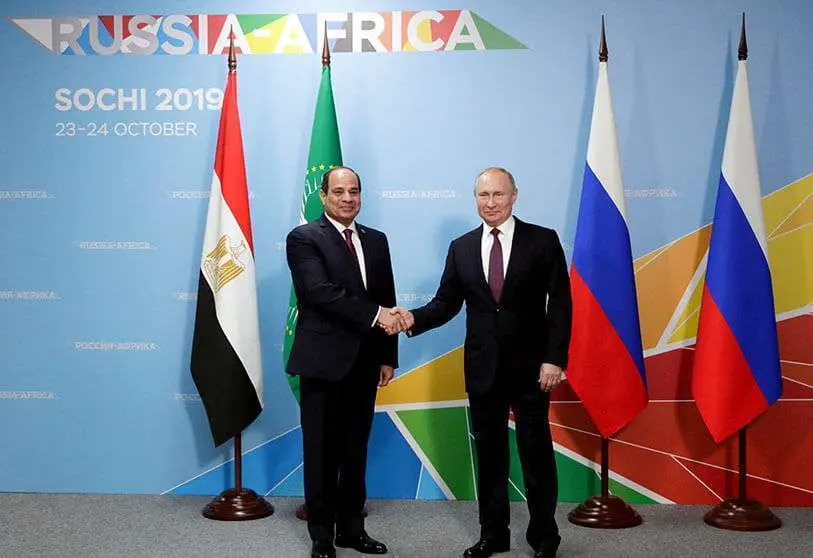Africa: the game board where Russia wins positions

Construction of military bases, deployment of mercenaries and military and trade cooperation agreements These are the three lines that Russia is following in its expansion in Africa.
According to a report by the German Ministry of Foreign Affairs, quoted by the newspaper Bild, since 2015, Russia has concluded military cooperation agreements with 21 African countries, when previously it had only four. Vladimir Putin does not want to be left behind on the African continent, and, just as China is doing, he is looking for allies that will allow him to expand his influence.
In recent months, nearly 200 Russian mercenaries have been deployed in Mozambique to fight a growing branch of Daesh. In addition, another German report indicated that Russia obtained permission to establish military bases in six African countries, including Egypt and Sudan, in a move that reveals Moscow's desire to protect its role in Libya through a belt of bases where attacking it would be extremely dangerous. This is in addition to the hundreds of Russian fighters who have arrived in Libya as part of the Kremlin's campaign to intervene on behalf of the leader of the Libyan National Army, Khalifa Haftar. The Libyan conflict will serve as a test of the effectiveness or otherwise of the strategies carried out by the key states in the conflict, and whether the results will support or limit Russian expansion in Africa.
This support worries the United States, which has seen in these movements the intention to build a military force similar to AFRICOM (US military command in Africa) capable of balancing the scales towards Haftar and of repeating the tactics carried out in Sira.
This July, AFRICOM said there was "increasing evidence, through satellite images of Russian military cargo planes, including the IL-6, carrying supplies to the fighters of the Wagner Military Group - a private Russian military contractor (...) The type and size of the equipment reveals an intention to maintain offensive combat capabilities," although the Kremlin has denied these allegations.
For its part, Turkey had hoped that Russia's presence in Libya would be merely tactical and thus obtain greater concessions than in Syria, but it seems that Putin's interest in the Libyan powder keg has further complicated the alliances.
Rooted in Africa during the East-West rivalry in the Cold War scenario, Russia largely withdrew from the continent after the collapse of the Soviet Union in 1991. But in recent years, Moscow has revived Soviet-era client relationships.
Russia's main African ally is Egypt. In October 2019, President Vladimir Putin organized a summit in Sochi between Moscow and African countries. It was Abdel Fattah al-Sisi who led this meeting, together with the Russian leader, which resulted in the signing of more than 500 agreements, memoranda and contracts worth 11.3 billion euros between Russia and more than 40 African governments.
According to data from the International Monetary Fund (IMF), Russia has tripled its commercial exchanges with the continent in barely a decade, but mainly in the last three years. Its main partners are Egypt, Morocco, Algeria and Tunisia.
Moscow maintains relations with Africa on two pillars: cooperation in the field of security and the exploitation of resources and nuclear development.
In the field of security, Moscow obtained guarantees for establishing military bases in Egypt, Central African Republic, Eritrea, Madagascar, Mozambique and Sudan. In addition, according to Bild, Russia secretly and sometimes formally trains the forces of these countries. In this context, it has 180 soldiers in the Central African Republic. It is in this country that, according to The New York Times, a Russian was installed as the president's national security advisor and, in return, the African government is selling gold and diamond mining rights to Moscow at a much lower than usual value.
The Russian presence in Africa is clear, and its main objective is to achieve political, economic and military gains, at a time when the African continent has become a playground for different countries such as China, Turkey, Iran and the United States.
On several occasions, the Russian president has stated that Africa is one of his priorities in terms of foreign policy and has talked about offering diplomatic and political support, defence and security aid, as well as economic and humanitarian assistance.
Faced with this situation, at the end of 2018, the then US National Security Advisor John Bolton announced a new Washington strategy for Africa, in part aimed at countering both Chinese and Russian influence.










